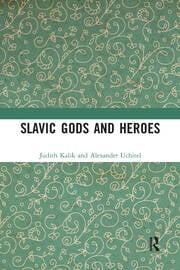This book offers a radical reinterpretation of the Slavic pagan religion made on the basis of a thorough re-examination of all reliable sources. What did Slavic pagan religion have in common with the Afro-American cult of voodoo? Why were no Slavic gods mentioned before the mid-tenth century, and why were there no Slavic gods at all between the Dnieper and the Oder? Why were Slavic foundation legends similar to the totemic myths of the nomadic peoples of the Eurasian Steppe, and who were Slavic Remus and Romulus? What were the Indo-European roots of Slavic hippomantic rituals, and where was the Eastern Slavic dragon Zmey Gorynych born? Answers to these and many other provocative questions can be found in this book.
Contents ;List of Charts ;List of Tables ;Preface ;Introduction;Part One: Ancient Slavs ;1. Ancient Slavs and their Neighbors ; Slavic languages ; Slav's homeland ; Hydromymics ; Names of the Slavs and Slavic names for their neighbors ; Slavic migrations ; Slavic scripts ; Slavic society ; Slavic states ; The Christianization of the Slavs ;2. Earliest Evidence of Slavic Religion ; Procopius, The Gothic War ; St. Boniface, A letter to King Ethelbald of Mercia ; Ahmad ibn Fadlan, Travel-Report; Constantine Porphyrogenitus, De administrando imperio ; Widukind of Corvey, Deeds of the Saxons; Leo the Deacon, History ;3. Conclusions ;Part Two: Gods ;4. Sources ; Documentary evidence ; Bruno of Querfurt, A Letter to King Henry II ; The Magdeburg Charter ; Historiography ;Thietmar of Merseburg, The Chronicle ; Adam of Bremen, History of the Archbishops of Hamburg-Bremen ; Helmold of Bosau, The Chronicle of the Slavs; Saxo Grammaticus, The History of the Danes; The Knytlinga Saga ; The Russian Primary Chronicle ;Hagiography ; The Life of Otto, Apostle of Pomerania; Ebo ; Herbord ; Wolfger of Prüfening ; Poetry ; The Tale of Igor's Campaign ;5. Svarozhich ;6. Sventovit ;7. Rugevit ;8. Porevit, Porenut and Turupid ;9. Pizamar and Chernoglav ;10. Prove and Podaga ;11. Triglav ;12. Gerovit ;13. Pripegala ;14. "Vladimir's Gods";Perun ; Khors ; Dazh'bog (Dazhd'bog) ; Stribog ; Simar'gl ; Mokosh' ;15. Volos (Veles) ;16. Conclusions ;Part Three: Heroes ;17. Sources: Slavic National Historiography ; Cosmas of Prague, The Chronicle of the Czechs ; Gallus Anonymus, The Deeds of the Princes of the Poles ; Wincenty Kadłubek, Chronicles of the Kings and Princes of Poland ; The Chronicle of Great Poland ; The Chronicle of Dalimil ; Jan Długosz, Annals or Chronicles of the Famous ;Kingdom of Poland ;18. Bohemia ; Čech ; Krok ; Kazi ; Tetka ; Libuše ; 19. Little Poland ; Wiślanie ; The Drago of Wawel (Smok Wawelski) ; The Fratricide ; Wanda ; Lędzianie ;. Leszek I ;. Leszek II ; Leszek III ;20. Great Poland; 21. Kiev; 22. Croatia; 23. Reconstruction; Appendix 1: Indo-European Hippomancy ; India ; Persia ; Parthia ; Greece ; Rome ; Germanic Tribes ; Slavs ; Redarii ; Pomerania ; Rani ; Bohemia ; Little Poland ; Ireland ; Reconstruction ;Appendix 2: Zmey Gorynych ;Afterword ;Bibliography ; Index
Biography
Judith Kalik teaches East European history at the Hebrew University of Jerusalem. She has written extensively on the inter-religious encounters in Eastern Europe from the early Middle Ages to the early twentieth century.
Alexander Uchitel taught ancient history at the Hebrew University of Jerusalem and University of Haifa between 1985 and 2017. He is the author of numerous articles on diverse subjects related to the history and philology of ancient Greece and the ancient Near East.




